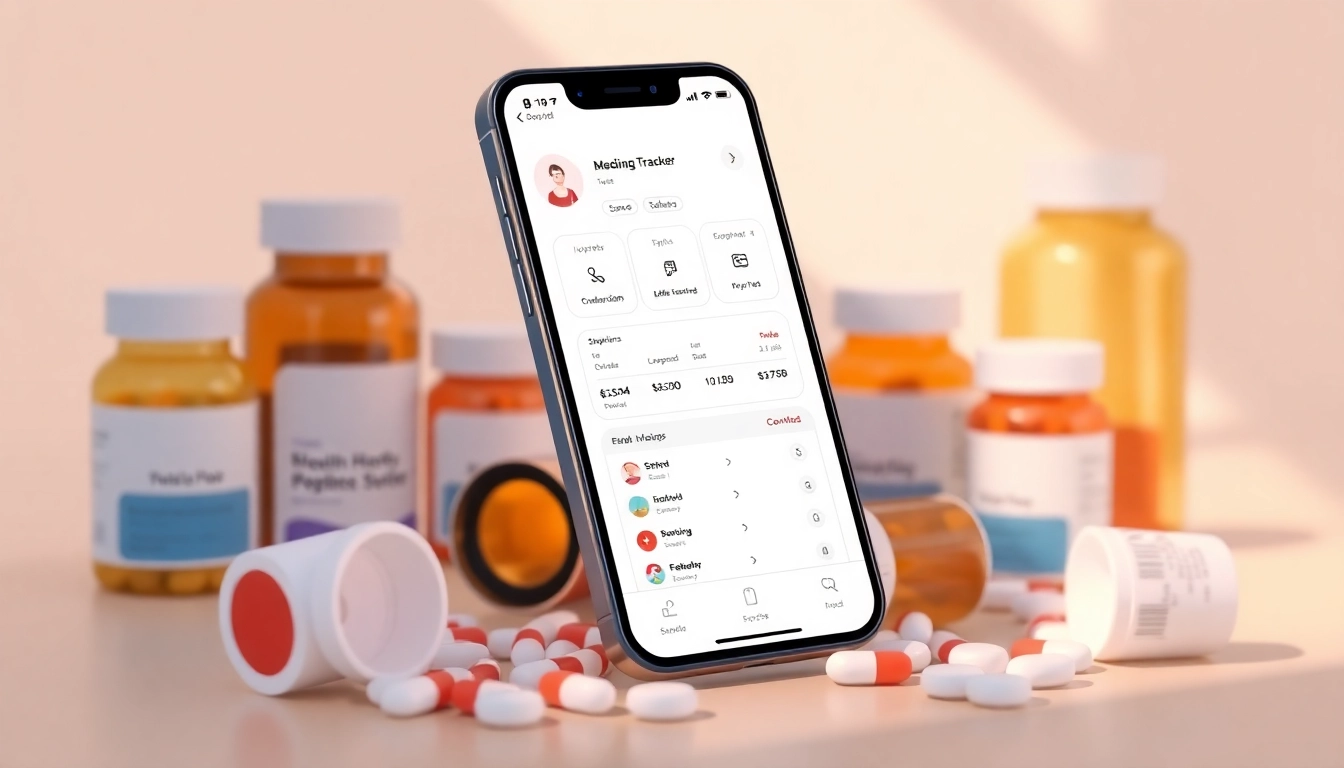Understanding the Importance of a Medicine Tracker
What is a Medicine Tracker?
A Medicine Tracker is a digital tool designed to help individuals manage their medication schedules effectively. It serves as a systematic way to record when medications are taken, ensure correct dosages, and track adherence to prescribed regimens. In an age where digital solutions simplify many aspects of our lives, a medicine tracker aids in managing complex health needs and increases the likelihood of adhering to medical advice.
Benefits of Tracking Your Medications
Tracking medications offers numerous benefits that are crucial for maintaining health and optimizing treatment outcomes. Here are some key advantages:
- Improved Adherence: Regular reminders and tracking help ensure medications are taken at the correct times and dosages, thus increasing adherence rates.
- Enhanced Communication: App-based or digital medicine trackers allow users to share medication logs with healthcare providers, leading to better-informed medical decisions.
- Customized Management: Many trackers can be tailored to user preferences, helping to set reminders based on individual schedules and lifestyle needs.
- Data Insights: Usage statistics and medication history can uncover patterns that healthcare providers can address, improving overall treatment effectiveness.
Common Challenges in Medication Adherence
Despite the benefits, many individuals face challenges that hinder medication adherence:
- Complex Regimens: Patients with multiple medications often struggle to manage doses and schedules.
- Forgetfulness: Life can get busy, and it’s easy to forget when to take medication without timely reminders.
- Side Effects: Adverse reactions can lead to non-adherence, as patients may opt to skip doses or stop altogether.
- Lack of Support: Without a structured support system or someone to help manage the regimen, patients may feel overwhelmed.
Key Features of an Effective Medicine Tracker
User-Friendly Interface
The design of a medicine tracking application is critical in ensuring user engagement and ease of use. A user-friendly interface should be intuitive, allowing users to quickly input medication details and navigate through functions. Features like simple navigation buttons, visual cues, and easy-to-read layouts enhance the user experience.
Reminders and Notifications
Efficient reminders and notifications are vital for improving medication adherence. These can be personalized to match users’ schedules, including options for notifications via push alerts, email, or text messages. Customization may also extend to frequency—daily, weekly, or even multiple times per day—ensuring patients are reminded in a way that suits their habits.
Integration with Health Devices
Another essential feature of effective medicine trackers is the ability to integrate with other health devices, such as wearable fitness trackers or health monitoring apps. This connectivity provides comprehensive visibility into an individual’s health and medication adherence, allowing for better-informed decisions and adjusted health plans.
Comparing Top Medicine Tracker Apps
In-Depth Review of Popular Apps
When choosing a medicine tracker, several popular apps stand out in functionality and user experience:
- Medisafe: An award-winning app that offers comprehensive tracking features, including medication reminders, reports, and the ability to sync with healthcare providers. Medisafe has received high user ratings, demonstrating its effectiveness.
- MyTherapy: Not only a medication tracker but also a health journal, it encourages users to log symptoms and measurements alongside medication adherence, making it a dual-purpose tool.
- Pill Reminder: This app is praised for its simplicity and ease of use. It provides push notifications and a visually appealing layout, perfect for those new to digital tracking.
- CareClinic: A more holistic approach, offering medication tracking alongside symptoms, health stats, and lifestyle tracking, enabling users to gain better insight into how medication impacts their overall health.
User Ratings and Feedback
User feedback plays a crucial role in understanding the effectiveness of a medicine tracker. For instance, Medisafe holds a 4.7-star rating with thousands of reviews commending its reliability and user-friendly features. Similarly, MyTherapy’s integration of health journaling has garnered praise for its comprehensive monitoring capabilities, with users reporting a significant increase in adherence to their medication routine.
Cost Analysis
The financial aspect of medicine trackers varies widely. While many apps offer free versions, premium features may require a subscription. Here’s a brief overview:
- Free Apps: Medisafe and MyTherapy provide basic features without charge, making them accessible for users seeking to get started with medication tracking.
- Paid Features: Users looking for advanced analytics or personalized support may need to explore paid options. The cost can range from $5 to $60 annually, depending on the level of service and features available.
Best Practices for Using a Medicine Tracker
Setting Up Your Medicine Tracker
To maximize the benefits of your medicine tracker, initial setup is crucial:
- Input Accurate Information: Ensure all medications, dosages, and schedules are entered accurately to avoid confusion later.
- Customize Alerts: Tailor the alert settings to your routine, considering the best times for reminders based on your daily activities.
- Engage with Healthcare Providers: Share your tracker data with healthcare professionals for personalized advice and adjustments.
Monitoring Your Progress
Monitoring your medication adherence regularly can provide invaluable insights. Look for trends such as missed doses or adherence during specific periods. Leverage this data to adjust your schedule or address underlying issues affecting adherence, such as side effects or regimen complexity.
Making Adjustments Based on Tracking Data
Use the insights gathered from your medicine tracker to proactively address adherence challenges. If you consistently forget doses at certain times, consider adjusting your schedule or employing additional reminders. Engage in discussions with your healthcare provider based on the data you accumulate to ensure an effective treatment plan.
The Future of Medicine Tracking Technology
Emerging Trends in Health Tech
As technology evolves, the landscape of medicine tracking is continually changing. Future trends could include:
- Artificial Intelligence to personalize health recommendations and improve tracking accuracy based on user behavior.
- Blockchain technology for secure sharing of personal health records and medication histories.
- Telemedicine integration that allows real-time prescription updates between patients and providers.
Potential Features for Next-Gen Medicine Trackers
Future medicine trackers may incorporate:
- Biofeedback: Using biometric data to tailor reminders and medication instructions based on physical health indicators.
- Smart Packaging: Including QR codes on medication packaging that users can scan for automatic updates and adherence tracking.
- Gamification: By incentivizing adherence through rewards and challenges, users are more likely to engage with their medication routine effectively.
How AI Can Enhance Medication Management
Leveraging AI will significantly enhance medication management in several ways:
- Predictive Analytics: Analyzing user habits to predict when a patient might be non-compliant and preemptively offering interventions.
- Natural Language Processing: Enabling more intuitive communication with users, allowing them to log medications using conversational language.
- Adaptive Learning: AI-driven trackers that learn and adapt based on individual user data can offer increasingly tailored user experiences over time.



